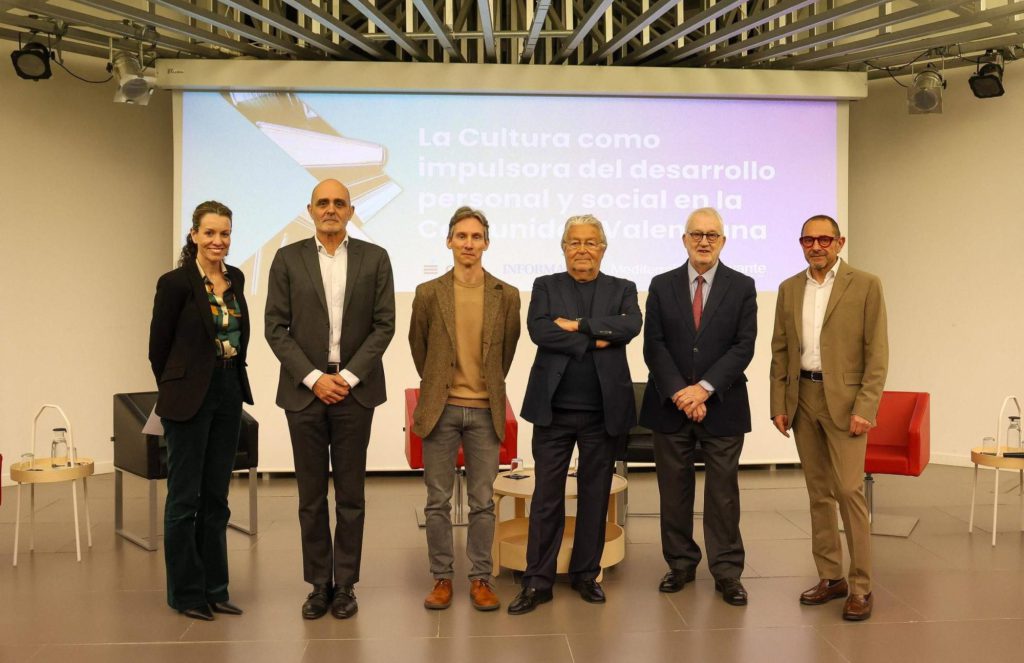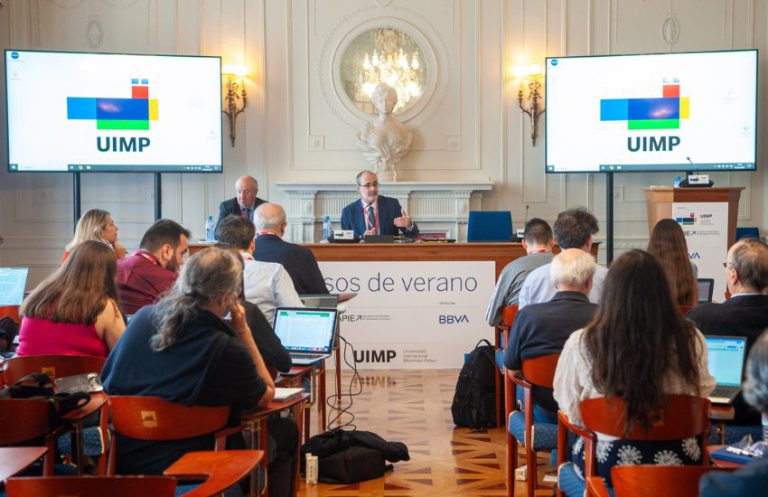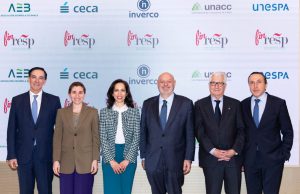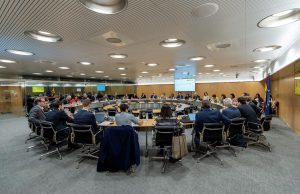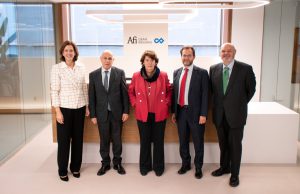Culture is a key factor in the transformation of society. In 2019, the WHO broke new ground by presenting a report that urges governments to introduce arts and culture into healthcare settings, believing that they are a healing element and therefore benefit our health. Caring for, promoting and disseminating culture is a commitment that many entities have taken on as a mission, which is why Levante-EMV, together with CECA, the Association of Banks, Savings Banks and Foundations, organised the colloquium 'Culture as a driver of personal and social development in the region of Valencia', on Friday 23 February.
The event, moderated by Silvia Tomás, Director of Institutional Relations of Prensa Ibérica in Valencia, featured Álvaro Borrás, Director of CaixaForum Valencia; Roberto Sanz, head of the Obra Social of Caixa Ontinyent; Rafael Alcón, Chairman of the Fundación Bancaja; Luis Boyer, Chairman of Fundación Mediterráneo; and Alberto Aza, CECA spokesperson.
'Culture is an antidote against indoctrination by promoting critical thinking, against intolerance by fleeing from dogmatism in favour of a continuous search for truth, against misunderstanding, because it allows us to understand where we come from and where we are going, and against social exclusion', said Alberto Aza, spokesperson for CECA, when Silvia Tomás asked about the role of culture in social development, because, as Tomás said, 'defining and developing attractive, sustainable, respectful and inclusive cultural projects is more important for a society than we imagine'.
Álvaro Borrás, Director of CaixaForum Valencia, stated that 'culture is important enough per se'. 'Any society that wants to develop needs culture. The more culture, the more development, and vice versa'. For Borrás, culture is 'a basic need', 'during the pandemic, when you were no longer afraid for your health, you were afraid of boredom'.
For the Chairman of Fundación Bancaja, Rafael Alcón, 'culture and social action are embedded in our DNA, without culture people do not move forward, it is an absolute necessity'. Alcón also perceives that 'there is no awareness of the need for culture'.
Meanwhile, the Chairman of Fundación Mediterráneo, Luis Boyer, spoke about the role of culture as a formative element. 'We are in the midst of technological progress that absorbs a lot of time, especially among young people, and we are losing things that do contribute, such as culture and education, which serve to transcend everyday life'. 'People do not reason on social media, they act like hooligans. Culture breaks this trend and consolidates the democratic system', added Boyer.
The head of the Obra Social of Caixa Ontinyent, Roberto Sanz, said that 'culture is social action'. 'University activities or education contribute to personal or social development, allow for advancement and create employment opportunities where we can develop our inquisitiveness'.
Obra Social
'The mission of Obra Social is to promote the social advancement of people, fighting against exclusion', said the spokesperson for CECA. 'Obra Social is made up of six lines of action: social action to address the needs of the most vulnerable groups; support for education and research; promoting culture; local development; the promotion of sport as a means of transmitting values such as effort and solidarity; and the environment and sustainability', declared Aza.
Cultural heritage
Another fundamental aspect of Obra Social is the conservation and dissemination of cultural heritage. Fundación Bancaja carries out this task with the works of Joaquín Sorolla. 'We have always been a benchmark when it comes to Sorolla. We have inherited and maintained this legacy through hard work'. Through numerous exhibitions such as 'Sorolla a través de la luz' (Sorolla through the light) or 'Sorolla en negro' (Sorolla in black), Valencian society and tourists who come to the capital of the River Turia can discover the work of the Valencian painter par excellence.
Fundación Mediterráneo is the custodian and depositary of a valuable artistic legacy. Its articles of association include the obligation to preserve and disseminate this heritage. 'Fundación Mediterráneo has acquired an entire legacy of outstanding people and we are dedicating a considerable amount of financial resources to digitalise it and make this cultural archive available to everyone', said its Chairman, Luis Boyer. The foundation also brings together three major artistic centres: the Modernist House Museum, the Azorín House Museum and the Alcoi Centre. 'Before the pandemic, we received from Azorín's family a donation of more than two thousand original documents, from photographs to cinema passes and a book to be published'. With all this, they are putting on the travelling exhibition 'La maleta de Azorín' (Azorín's suitcase).
The commitment of Fundación 'la Caixa' to culture is materialised with the creation of CaixaForum. 'In little more than a year we have had more than one million visitors', said Álvaro Borrás, Director of CaixaForum Valencia. 'The achievement of CaixaForum is to be able to offer a meeting place between knowledge and people, for all audiences and without hierarchies', he said. He also attributed the success of the museum to public-private collaboration, 'between the public and the private lies the communal'.
Caixa Ontinyent has its own cultural centre in the historic centre of the municipality, the aim of which is to 'host different types of activities such as exhibitions, conferences, talks, screenings, concerts, training courses, congresses, conventions, meetings and workshops, organised by Caixa Ontinyent and other groups', said the head of Obra Social, Roberto Sanz. 'The centre is an open space to engage the entire community, from attending a book presentation to requesting the space to hold a neighbourhood meeting. We wanted an open place where everyone could develop their interests', said Sanz.
Alliances
CECA is an example of the advantages brought about by the pooling of efforts between entities. 'Collaborating and cooperating is always a good way to achieve common goals', said its spokesperson Alberto Aza. 'As an association, an important part is to establish that framework, those meeting points. During the pandemic, it was thanks to this collaboration between banks and foundations that we were able to implement social plans of enormous significance. As members of the United Nations Global Compact, we have a commitment to the SDGs and SDG 17 talks about these partnerships to achieve common goals.
'In the field of culture we have launched a working group with the goal of working towards how entities can cooperate more in the field of culture, how to capitalise on exhibitions or how to work together in this great project of heritage digitalisation. Collaborate to the extent possible while respecting the particularities of each institution', added the CECA spokesperson.
Education and awareness
In terms of the educational function of culture, Rafael Alcón, Chairman of Fundación Bancaja, highlighted the "D-Disability Week", 'a social awareness initiative that takes place every year on or around 3 December, International Disability Day, with the aim of raising awareness of the need to advance in the integration of this group'. The foundation also carries out training sessions in educational centres throughout the year, working on the exhibitions it organises.
'Culture is education and enjoyment, but also a guarantee for the democratic system', stressed Luis Boyer, Chairman of Fundación Mediterráneo, in his final message. 'There is a component of social democratic education which, if it were to disappear, would be a catastrophe'.
'We have evolved with society. We have been able to create resources, digitalise and implement sustainability. Our proximity to the environment has allowed us and still allows us to do these things', said Roberto Sanz, from Caixa Ontinyent.
Álvaro Borrás, Director of CaixaForum Valencia, concluded his participation by stating that 'culture is the generation of a critical spirit, of reflection. We believe in culture and we grow with culture'.
'The world is inconceivable without culture; without music, without theatre, without literature, without art. Only chaos', concluded Alberto Aza.









